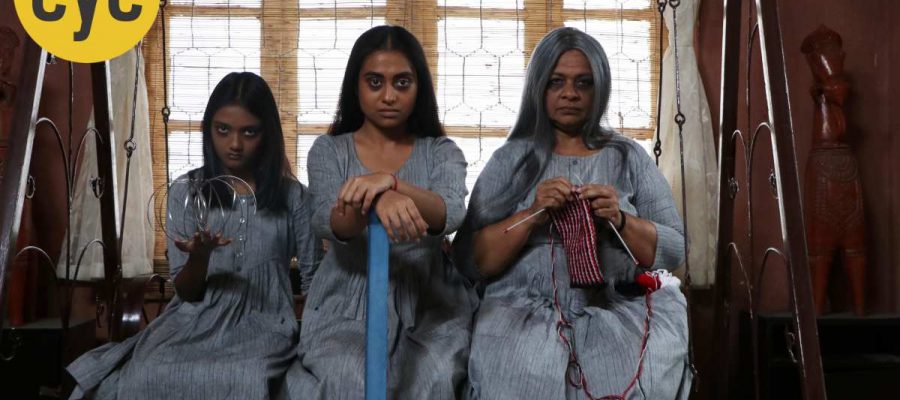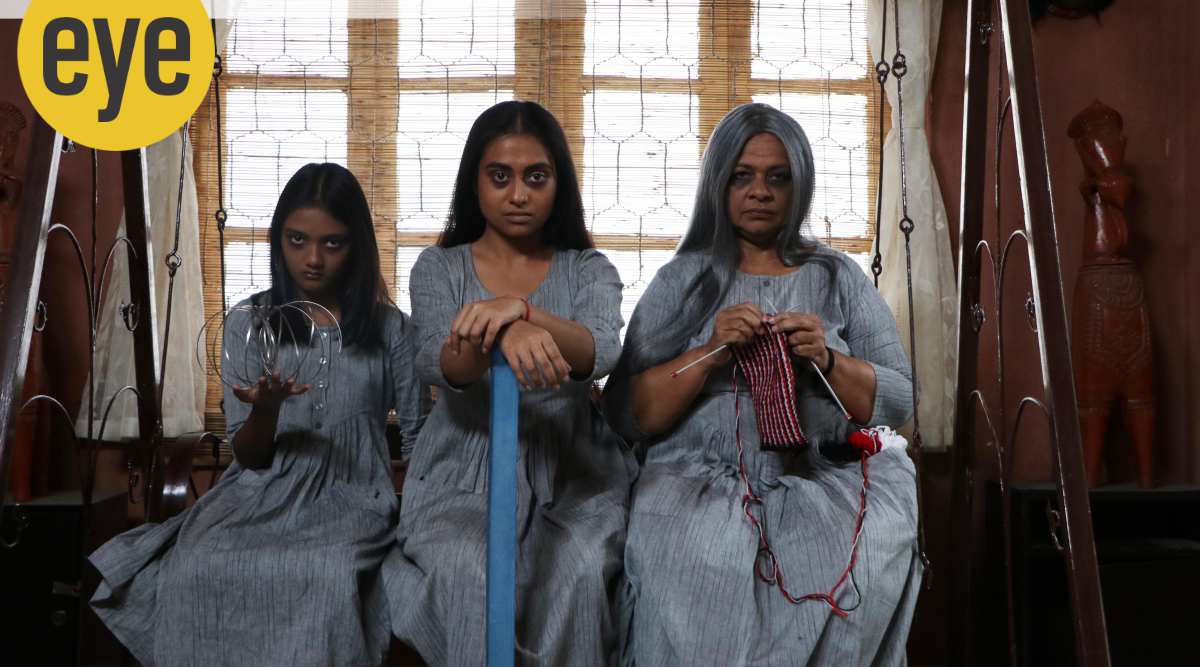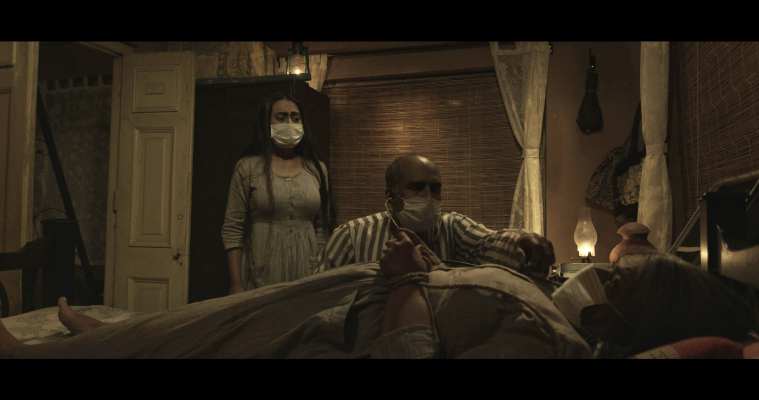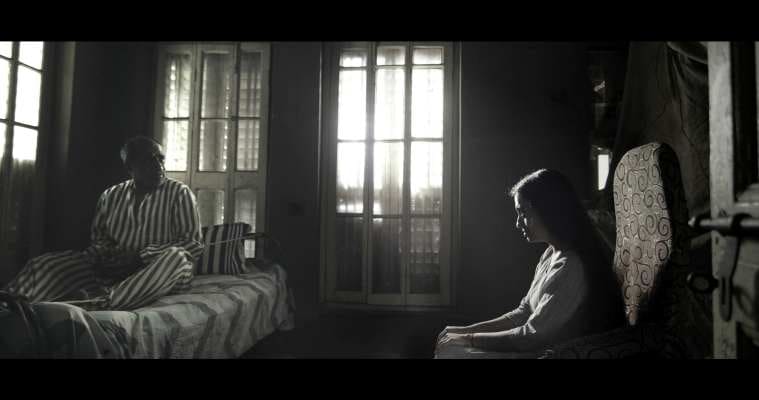Sarmistha Maiti and Rajdeep Paul's debut feature film marks the return — to feature films — of Aurora Film Corporation, ostensibly India’s oldest surviving and in-business studio/production house from the silent era.
When COVID-19 restricted her at home, a fear-gripped Sarmistha Maiti, 41, one half of the director duo of Kalkokkho (House of Time), observed, for the first time, that her little daughter would talk to “megh bhai” (brother cloud). Loneliness was scarier. “It was the longing for belonging…my biggest lesson was ‘how to deal with my own self’,” she says.
The duo’s other half, Rajdeep Paul, 40, was paranoid about his three elderly housemates, his father and aunts, to whom “the concept of sanitising and wearing masks was completely alien.” One of his aunts, a foodie, stepped out of their “containment zone para (area)” one day to return bearing shingara (samosa), her mask on her chin. Paul flipped and threw them away. A similar scene appears in the film, too. His “devious” mind thought, “what if the only way to survive the pandemic was by abducting a doctor and keeping him at home?”
Kalkokkho was thus born. The structure came next. He’d ponder daily, “Has the day actually passed, or is it a dream or a nightmare?” Time loop felt like the “most obvious choice”.
Satyajit Ray Film and Television Institute (SRFTI) alumni Maiti and Paul’s debut Bengali feature opens with a disgruntled doctor, on a morning jog, when a woman in a PPE suit rushes forth, pleading him to go with her to check on her ailing mother and daughter. He refuses, citing protocols. The next thing, he’s taken hostage — trapped spatiotemporally.
Kalkokkho’s world premiere will be on October 9 in New Currents segment of the 26th Busan International Film Festival. The other Indian film in the category is Natesh Hegde’s Kannada debut feature Pedro. Another Bengali film headed to Busan is Jadavpur University professor Madhuja Mukherjee’s Tillotama Shome-starrer, Shoojit Sircar-produced Deep6. There’s Aparna Sen, too. Though her Konkona Sensharma-starrer The Rapist is a Hindi film that will compete with Bangladeshi New-Wave director Mostofa Sarwar Farooki’s Nawazuddin Siddiqui-starrer No Land’s Man (in English), among others, for the Kim Jiseok Award.
The house, in Kalkokkho, is a simulacrum, an imitation that replaces, even upends, the real world and real-world norms as we know it. It’s a feminist utopia. The doctor (man/patriarchy/ first world) is tied up by Mamoni (nature/feminism/marginalised) until his true self as “a healer, not tyrant” is revealed. The three ghost-like women, like matryoshka dolls in grey dresses, call each other mamoni, a Bengali term of endearment for both mother and daughter, hammering in life’s cyclicality. They represent “past, present, future”, “paranoia, amnesia, loneliness”, the Freudian “id, ego, superego”, and the three fates of Greek mythology: Clotho, Lachesis, Atropos, one spins, the other weaves, and the third cuts.
The subject readily lent itself to horror — not of the jump-scare variety, but existential dread and psychological horror. It’s got a mix of magic realism, spiritual allegory and mythological symbolism (the Vedic story of Ekata, Dwita, Trita; chased by wolves, Trita falls into a well and to escape, has to make a sacrifice). “Spirituality, mythology, religion, one of the biggest reasons for their existence is to understand how to deal with your own mortality,” says Paul, who’s been intrigued by recent apocalypse series/films (Dark, Sacred Games), even before COVID-19. In Sandra Bullock’s Bird Box (2018) — which topped Netflix Original films’ top viewership hours at 282 million hours in the first 28 days, according to data released this week — “except the demonic things in the end, almost 80 per cent of the film only speaks of a horror, not seeing but knowing it exists,” he says.
If their film reminds one of Nicole Kidman’s The Others (2001), one won’t be too far from the truth, “the fear isn’t of ghosts but of loneliness, death, losing identity,” says Maiti, “with COVID, our imagination, too, was getting circumscribed by these elements.”
After documentaries (on Mrinal Sen; the National Award-winning At the Crossroads on Calcutta’s ace drummer Nondon Bagchi) and short films (Malai, 2018, about a regressive Odia wedding practice, and Kayantar, 2019, on the Islamic community keeping the Bahurupi tradition alive), their debut feature was to be about Citizenship (Amendment) Act. On a location recce in Murshidabad, a torched Sargachi railway station, near Beldanga, made them rethink.
Kalkokkho, which after Busan will open Boston’s 7th Caleidoscope Indian Film Festival and compete in the 20th Dhaka International Film Festival, marks the return — to feature films — of ostensibly India’s oldest surviving and in-business studio/production house from the silent era. The Kolkata-based 115-year-old Aurora Film Corporation’s legacy includes producing and distributing films like Satyajit Ray’s Aparajito (1956) and Jalsaghar (1958), distributing Pather Panchali (1955), Ritwik Ghatak’s Ajantrik (1958), producing the first Bengali film shot abroad Bhogini Nibedita (1960), producing shows like Derek O’Brien’s Cadbury Bournvita Quiz Contest in the ’70s. Their last feature film was Utpalendu Chakraborty’s Moyna Tadanta (Post Mortem, 1980), which tanked.
“We were always into experimental, offbeat films. Even when (superstars) Uttam Kumar-Suchitra Sen films were at their peak, my father decided to distribute a certain Satyajit Ray’s Pather Panchali,” says Anjan Bose, 75, Aurora’s third-generation managing director. The two-time National Award-winning director (for documentaries) adds, most Bengali films at festivals today have some foreign talent in the crew, the DOP, editor, etc. He’s instead determined to bankroll “Bengali new wave” and home-bred fresh talents (from FTII, SRFTI, etc.).“We have potential, let’s give them the scope,” he says.
Source: Read Full Article





